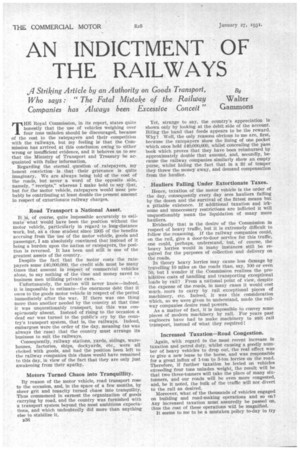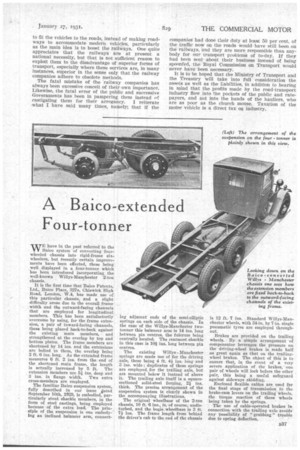AN INDICTMENT OF THE RAILWAYS
Page 54

Page 55

If you've noticed an error in this article please click here to report it so we can fix it.
Striking Article by an Authority on Goods Transport, By Who says : " The Fatal Mistake of the Railway Walter Companies has Always been Excessive Conceit Gammons THE Royal Commission, in its report, stakes quite honestly that the use of vehicles weighing over four tons unladen should be discouraged, because of the cost to the ratepayers and their competition with the railways, but my feeling is that the Commission has arrived at this conclusion owing to either wrong or insufficient evidence, and it behoves us to see that the Ministry of Transport and Treasury be acquainted with fuller information.
. Regarding the eternal question of , ratepayers, my honest conviction is that their grievance is quite imaginary. We are always being told of the cost of the roads, but never a word of the opposite side, namely, "receipts," whereas I make bold to say that, but for the motor vehicle, ratepayers would most probably be contributing at least double the present amount in respect of extortionate railway charges.
Road Transport a National Asset.
It is, of course, quite impossible accurately to estimate what would have been the position without the motor vehicle, particularly in regard to long-distance work, but, a's a close student since 1905 of the benefits accruing from the use of the motor vehicle, goods and passenger, I am absolutely convinced that instead of it being a burden upon the nation or ratepayers, the position is reversed. It has been and still is one of the greatest assets of the country.
Despite the fact that the motor costs the ratepayers some £40,000,000, the credit side must be many times that amount in 'respect of commercial vehicles alone, to say nothing of the time and money saved to business men utilizing private cars.
Unfortunately, the nation will never know—indeed, it is impossible to estimate—the enormous debt that it owes to the goods motor vehicle in respect of the period immediately after the war. If there was one thing more than another needed by the country at that time it was unquestionably transport, but this was conspicuously absent. Instead of rising to the occasion a deaf ear was turned to the public's cry by the country's transport system, that is, the railways. Indeed, embargoes were the order of the day, meaning (as was always the case) that the country must arrange its business to suit the railways.
Consequently, railway stations, yards, sidings, warehouses, factories, ships, dockyards, etc., were all choked with goods, and had the position been left to the railway companies this chaos would have remained to this day, in view of the fact that they are only just awakening from their apathy.
Motors Turned Chaos into Tranquillity.
By reason of the motor vehicle, road transport rose to the occasion, and, in the space of a few months, by sheer grit and tenacity turned chaos into tranquility. Thus commenced in earnest the organization of goods carrying by road, and the country was furnished with a transport system beyond the most ambitious expectations, and which undoubtedly did more than anything else to stabilize it.
136 Yet, strange to say, the country's appreciation is shown only by looking at the debit side of the account. Biting the hand that feeds appears to be the reward. Why? Well, the only reasons obvious to me are, first, because the ratepayers show the lining of one pocket which once held £40,000,000, whilst concealing the pass book which proves that they have been reimbursed by approximately double that amount, and, secondly, because the railway companies similarly show an empty purse, whilst hiding the fact that in a fit of temper they threw the money away, and demand compensation from the haulier.
Hauliers Falling Under Extortionate Taxes.
Hence, taxation of the motor vehicle is the order of the day, consequently every day sees hauliers failing by the dozen and the survival of the fittest means but a pitiable existence. If additional taxation and irksome and unnecessary restrictions are inflicted it will unquestionably mean the liquidation of many more hauliers.
Evidently that is the desire of the Commission in respect of heavy traffic, but it is extremely difficult to follow the reasoning. If the railway companies could, on the rail, give a door-to-door service for this traffic, one could, perhaps, understand, but, of course, the heavy lorries would in Many instances still .be required for the purposes of collection and delivery on the roads.
In theory heavy lorries may cause less damage by travelling 10 miles on the roads than, say, 100 or even 50, but I wonder if the Commission realizes the prohibitive costs of handling and transporting exceptional loads by rail? From a national point of view, despite the expense of the roads, in many cases it would cost much, more to carry by rail -exceptional pieces of machinery, etc. Indeed, it was this consideration which, so we were given to understand, made the railway companies desire road powers.
As a matter of fact, it is impossible to convey some pieces of modern machinery by rail. For years past engineers have had to make machinery to suit rail transport, instead of what they required!
Increased Taxation—Road Congestion.
Again, with regard to the most recent increase in taxation and petrol duty, whilst causing ,a goodly number of heavy vehicles to drop out, the real effect was to give a new lease to the horse, and was responsible for a great influx of 1-ton to 3-ton lorries on the road. Therefore, if further taxation be levied on vehicles exceeding four tons unladen weight, the result will be that two three-tonners will take the place of many sixtonners, and our roads will be even more congested, and, be it noted, the bulk of the traffic will not divert to the rail as desired.
Moreover, what of the thousands of vehicles engaged on building and road-making operations and so on? Any increased taxation must assuredly be passed on, thus the cost of these operations will be magnified.
It seems to me to be a mistaken policy to-day to try to fit the vehicles to the roads, instead of making roadways to accommodate modern vehicles, particularly as the main idea is to boost the railways. One quite appreciates that the railways are at present a national necessity, but that is not sufficient reason to exploit them to the disadvantage of superior forms of transport, especially where these services are, in many instances, superior in the sense only that the railway companies adhere to obsolete methods.
The fatal mistake of the railway companies has always been excessive conceit of their own importance. Likewise, the fatal error of the public and successive Governments has been in pampering them instead of castigating them for their arrogancy. I reiterate -what I have said many times, namely; that if the
companieshad done their duty at least 50 per cent, of the traffic now on the roads would-have still been on the railways, and they are more responsible than anybody for our transport problems of to-day. If they had been sentabout their business instead of being spoonfed, the Royal Commission on Transport would never have been necessary.
It is to be hoped that the Ministry of Transport and the Treasury will take into full consideration the assi-kts as well as the liabilities, in addition to bearing in mind that the profits made by the road-transport industry flow into the pockets of the public and ratepayers, and not into the hands of the hauliers, who are as poor as the church mouse. Taxation of the motor vehicle is a direct tax on industry.




































































































